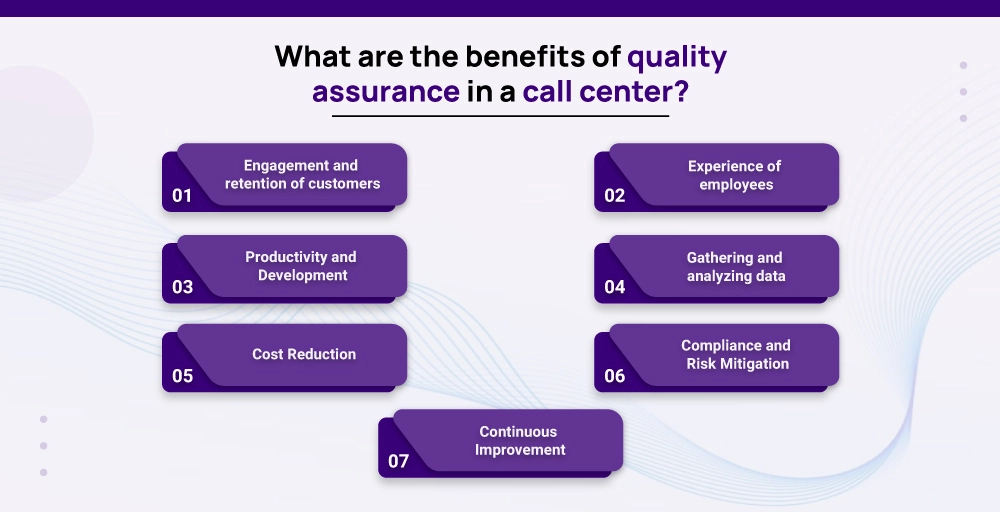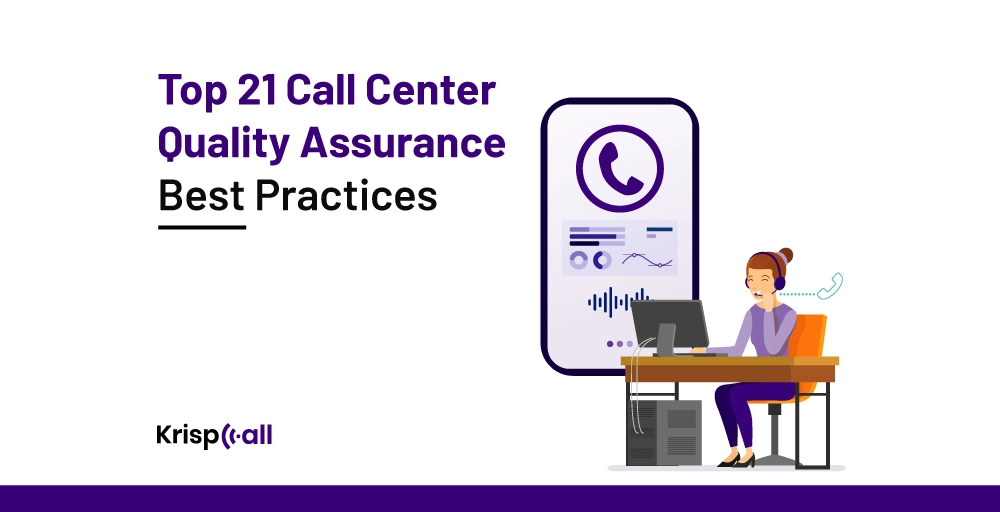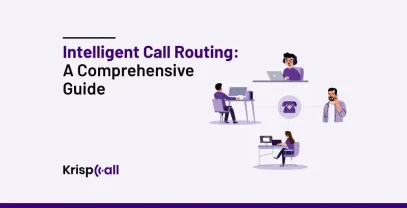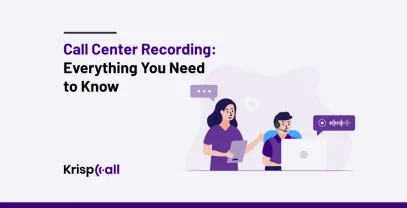Looking to establish a quality assurance strategy for your call center to deliver an even better experience to your customers?
We all know adopting new initiatives is difficult, even if they are beneficial, and in the case of quality assurance, especially in a contact center, it is not quite as straightforward as it seems. Although QA as a strategic tool has many advantages, many organizations either execute it improperly or simply don’t implement it at all.
The truth is that starting a Call Center Quality Assurance Program can be a challenge, of course, but it’s not impossible. So here we are!
In this article, we will discover the essence of Call Center Quality Assurance (QA) and why it is important and beneficial for your business, understand the significance of a QA scorecard and Call Center Quality Management, unravel call center quality assurance best practices that can revolutionize your call center operations, and lastly, some tips to overcome some common challenges when implementing a QA process.
Let’s get going and learn the essentials!
What is Call Center Quality Assurance?
In general, the purpose of a Call Center Quality Assurance process or a Contact Center Quality Monitoring software is to analyze as well as pinpoint quality standards, identify performance problems, and coach effectively.
It is the process of monitoring and evaluating the interactions of call center representatives with the customers to ensure that the outcome of the interactivity meets or exceeds the pre-established standard of the company.

Why is Quality Assurance important in a Call Center?
In a call center, quality assurance can prove to be a driving factor that can lead to several favorable results like enhanced call center productivity, reduced stress of call center agent, maximized customer satisfaction, and reduced customer churn, all while enabling a QA specialist to make data-driven decision-making, improving the overall efficiency of the contact center, and standardizing the communication process with the clients.
What are the benefits of quality assurance in a call center?
As for a call center that has an effective QA plan, it certainly has high-quality end-user interactions, a visible improvement in key performance indicators, and many other benefits, making it a vital part of the overall operations. So, let’s take a look at the benefits of quality assurance in a contact center.

Engagement and retention of customers
One key advantage of having quality assurance in place is its positive impact on customer engagement and retention. Its existence itself can ensure the consistency of all customer interactions or even take it to the next level and the current expectations.
And one more thing, it can also help in the identification of areas for improvement in the service, which can thus lead to higher customer satisfaction and increased loyalty.
Experience of employees
Another one of its benefits is an improved development of the work environment as a whole. Feedback sessions and coaching segments within the call center quality assurance process can provide valuable insights or criticism that can assist contact center agents in developing their skills.
On the flip side, those sessions can boost employee morale by recognizing and rewarding high-quality performance, which ultimately can enhance overall job satisfaction.
Productivity and Development
The benefits of call center quality assurance program extend to the productivity and development sectors as well. As for that, it provides insight into the specific training needs of individual agents, thus giving them opportunities for skill development among call center agents.
And once their abilities are upto the threshold, this, in turn, leads to enhanced efficiency of call handling processes, leading to improved productivity and reduced call resolution times.
Gathering and analyzing data
Another beneficial factor of having quality assurance in a call center is the ease of gathering and analyzing the data related to customer interactions for the sole purpose of improving service delivery by immediately resolving common issues.
Furthermore, the QA process largely contributes to process improvement steps like decision-making, resource allocation, and strategic planning, providing valuable insights for informed business decisions.
Cost Reduction
One more visible and crucial benefit is its built-in ability to reduce overall operational costs. With it, contact centers can automate mundane tasks like repetitive calls and promptly address issues to eliminate call escalation.
Aside from that, it also helps minimize the likelihood of errors and misunderstandings and, hand in hand with that, decreases the need for costly corrections, contributing to overall cost savings.
Compliance and Risk Mitigation
In terms of risk mitigation and compliance, a call center quality assurance strategy has its fair share of benefits. To adhere to that statement, QA in a contact center ensures that agents abide by the company’s regulations and organizational policies during any form of contact with customers.
And with the complete following of the policies, in the end, it directly mitigates the risk of legal and financial repercussions associated with non-compliance or mishandling of customer information.
Continuous Improvement
Lastly, it also plays a significant role in fostering a culture of continuous improvement. A solid QA approach, in its presence, ensures regular assessments and refinements of the call center quality assurance program, contributing to ongoing enhancement.
This proactive approach, on one side, encourages the team to address emerging challenges and adapt to changes in customer expectations; on the other, it supports the call center’s long-term success.
What is a Call Center Quality Assurance scorecard?
A call center quality assurance scorecard is an assessment tool that is used to measure the performance of a contact center. You can think of it as a report card that provides you with a detailed analysis of your call center agent’s performance and quality of customer interactions and pinpoints the positives and negatives of your frontline team.
In addition to that, it can also provide you with a definitive framework for evaluating various aspects of a call (whether it be ongoing or a recorded one), including agent professionalism (past or present), problem-solving skills, adherence to procedures, and customer satisfaction.
Having known that, now, let’s move on to the real topic at hand.
21 Call Center Quality Assurance Best Practice
An impactful QA program engages agents at all phases, which means from development and rollout to calibration and continuous improvement, all are included. However, for the QA initiative to be truly successful, it is important to follow some best practices.
So, here are the top 21 QA best practices that you should follow to ensure the success of your contact center:
1. Set clear goals for Call QA
Before even beginning a process, we all know this concept; in call center QA, we must first clearly define achievable objectives. The quality assurance process might also need a roadmap if you set specific, measurable goals aligned with overall business objectives.
Thus, the clarity provided by you will not only guide your team but also ensure that everyone understands the purpose and direction of the quality assessment efforts.

2. Develop a comprehensive evaluation framework
Once you’ve set your company’s goals, take those into consideration and build a robust evaluation framework that considers the various dimensions of call quality and resolves around the pure concept of your true goals.
As part of this process, you may have to create a set of criteria like accuracy, efficiency, empathy, and problem-solving skills to assess agent performance. This record should be used as a scorecard to assess how your team performs holistically and identify strengths and weaknesses.
3. Get Customer Feedback
As soon as you have created a comprehensive framework for your call center’s QA process. The next step is to get direct feedback from your trusted customers just to find out about their level of satisfaction and identify areas of importance that need to be addressed immediately.
In order to do this, you can implement surveys to gather data and then analyze those valuable inputs to refine QA goals as well as fine-tune your model.
4. Implement a structured call monitoring process
As we move on to the evaluation step, which is also vital for maintaining quality standards and providing a fair and reliable assessment of each agent’s performance. One way to do it is to randomly select calls for review for QA, and for that, you can use a variety of call quality monitoring methods, such as live call center quality monitoring and call recording analysis.

You might not be aware of this, but this assessment itself is essential to maintain the consistency of the interactions and meet your company’s standards.
5. Improve agent performance
When you have the data in hand by evaluating your representatives’ performances, it is time to elevate and improve agent performance through various targeted methods. The best way to achieve this is to provide training, constructive feedback, and coaching sessions.
As a result, you will surely notice that this approach not only boosts individual performance but also contributes to a more engaged and motivated team.
6. Provide regular and actionable feedback to agents
After that, you need to take an interest in nourishing agent growth by offering consistent and actionable feedback that motivates and drives them. To take it into full effect, you should provide constructive feedback as it is a valuable development tool, but constructive criticism is just as valuable as constructive feedback.
Be supportive and encouraging when identifying areas for improvement. Coaching agents help them refine their skills and create a supportive environment that encourages continuous development.
7. Track and measure call quality trends
You might already know this, but still, here it is- Keep a close eye on Key Performance Indicators (KPIs) like average handle time (AHT), first call resolution (FCR), and customer satisfaction (CSAT) to monitor call quality trends.

Aside from that, another thing is that continuously analyzing trends over time provides insights into areas for improvement, guiding decisions related to training, staffing, and process enhancement, so you should do that, too.
8. Empower agents to take ownership of their performance
Perhaps this is obvious; likewise, you need to foster a sense of ownership among agents by involving them in setting QA goals and criteria and encouraging them to self-monitor their calls and identify areas for improvement.
For this to work, you will have to give some power to them as well, so simply provide access to training and coaching resources, which typically will enhance accountability and motivate them to consistently deliver high-quality service.
9. Leverage technology to enhance QA processes
Another important thing, which is a never-forget one, is embracing technology to streamline QA processes. Make sure you use all the available solutions and integrate most of those to enhance, if not streamline, the efficiency and effectiveness of your current quality assurance efforts.
Here’s a tip- you can use call recording software for in-depth analysis, implement analytics tools to identify patterns, and leverage quality management systems to deliver and track feedback.
10. Foster a culture of continuous improvement
Continue with efforts to cultivate a culture that values openness and regular feedback and pressing towards it with modesty. It is a must for you to regularly review and update QA processes to align with changing business needs.

And you’ve achieved a milestone, celebrate that success, and recognize achievements, all of it to foster a positive environment that keeps employee motivation high.
11. Train agents on effective communication skills
Well, it is never unheard of- to get the best results for the task at hand, the master needs to prepare their apprentice. Which, here, means communication skills. In other words, equip agents with the tools for effective communication through comprehensive training on active listening, empathy, and conflict resolution.
For that, you can create role-playing scenarios that allow agents to practice and apply these skills in real-world situations, ensuring clear and meaningful interactions with customers.
12. Provide timely feedback
Train, develop, manage, and offer constructive feedback promptly after evaluations, merely to ensure your QA personnel are comfortable giving feedback to agents. Make sure the coaches don’t avoid this important task by “coaching them yourselves.”
Guess what this timely feedback allows agents to address issues promptly and reinforces positive behaviors, contributing to continuous improvement of the QA process and the call center as a whole.
13. Equip agents with product knowledge and troubleshooting skills
In addition to the previously mentioned best practices, also make sure that your agents fully possess a deep understanding of your products and services. If not, educate them on specific training on troubleshooting common customer issues, empowering agents to independently handle a wide range of customer inquiries.

Let me tell you something! This knowledge will improve their confidence and equip them to provide more informed and efficient support to your customers.
14. Implement call scripting and templates
Now, to enhance customer interactions, agents can make use of call scripts, as these scripts will serve as a valuable resource, helping agents to ensure consistency in their responses. On top of that, agents should have access to knowledge bases and resources to empower them in delivering effective support.
Additionally, you can also have a set of pre-built templates for repetitive and frequently asked questions (FAQs) to provide quick, accurate, and sufficient answers.
15. Monitor and manage call volume and wait times
Next, take your time, keep a keen eye on call volume patterns, and observe wait time as well. Optimize your operational capabilities by tracking the fluctuations and then deal with the negative impacts caused by those.
To get real results, implement staffing strategies to ensure adequate coverage during peak periods, and dont forget to utilize technology to optimize call routing, reducing wait times and contributing to an overall smoother customer experience.
16. Address customer complaints promptly and effectively
All of this is for the customer’s satisfaction, right? Whatever the case may be, one more thing to include as a best practice is the transparency of the process for handling customer complaints. In order to do so, thoroughly investigate and provide timely resolutions.

You can do it yourself or give this responsibility to someone who views complaints as opportunities to identify systemic issues and implement improvements, showcasing a commitment to customer satisfaction.
17. Cultivate a positive and supportive work environment
We’ve already discussed how fostering a culture of continuous improvement is one of the “best-best practices.” Now, take note that cultivating a positive work culture is key to a successful call center and encourages teamwork and collaboration among agents.
For that to take effect, simply recognize and reward agent contributions and provide opportunities for professional development. At the same time, creating a supportive work environment contributes to overall employee satisfaction and performance.
18. Utilize technology to automate routine tasks
Technology’s implications are immense and limited by imagination, and in that case, you should undoubtedly harness the power of technology to ease the workload for your own good.
Implement chatbots or virtual receptionists for basic inquiries and automated call routing to connect customers to the appropriate agent. This streamlines processes and reduces administrative tasks, enhancing overall contact center efficiency.
19. Benchmark your performance against industry standards
It is a must for you to regularly gauge your call center’s performance by comparing metrics to industry benchmarks. Having done that, you will be able to identify areas for improvement based on the comparisons to gain a competitive edge and continuously strive to set new standards for call quality and customer satisfaction.

20. Use data to drive decision-making
Make sure that data exists for driving decision-making making, and if not, harness the power of data by collecting and analyzing information from various sources and methods. And when you have that, make decisions to enhance the efficiency and effectiveness of your call center operations.
An easy method is to utilize call recordings, customer surveys, and agent metrics to identify trends, patterns, and areas for improvement for that precise purpose.
21. Stay up-to-date on industry trends and best practices
As they say, all problems require immediate solutions, whether they be traditional or modern ones. To get a proper gist of those and stay informed, try attending conferences, reading publications, and networking with other call center professionals to stay up-to-date with the latest trends.
Lastly, don’t forget to incorporate all the best practices mentioned above for continuous improvement. This commitment to staying updated will reflect in your work and ensure that your contact center remains competitive.
What are the tips for overcoming common challenges in implementing QA in call centers?
As implementing an efficient QA program in a contact center is a challenge on its own, the process is accompanied by a number of other obstacles that limit the smooth operation of call centers. To deal with that, here are some tips to overcome those:
- Clearly define goals and document all your QA processes.
- Choose the Right Quality Assurance Analysts, tools, and technology that align with your business objectives.
- Regularly update and utilize your quality assurance software to the fullest.
- Provide regular feedback to your call center agents based on QA assessments.
- To evaluate the performance of agents, you can establish benchmarks for key performance indicators (KPIs).
- Encourage agent involvement in the QA process by seeking their feedback on evaluation criteria.
- Proactively address any resistance or negative perceptions among agents.
- Maintain an open and transparent communication channel with agents, managers, and stakeholders.
- Acknowledge and celebrate the achievements of agents and the call center as a whole.
- Integrate customer feedback into the QA process to gain a more comprehensive view of agent performance.
Final Thoughts!
To sum everything up, implementing call center QA is a difficult task, but following the 21 best practices mentioned in this blog and implementing those in your contact center can lead to a transformative customer experience. Also, by prioritizing quality assurance, businesses can not only meet but exceed customer expectations, creating a competitive edge in the market.
As a final note, for those who are in dire need of an all-in-one call center solution free from challenges and requiring minimal labor for implementation, KrispCall is the answer. Upgrade your call center operations with it, a modern contact center software designed to streamline processes and enhance customer interactions.
FAQs
How to improve Quality Assurance in a Call Center?
When established correctly in a call center, a QA strategy itself can result in enhanced customer service delivery, better employee productivity, and boosted business operations. However, to improve its actual effectiveness on the call center’s operations, you need to follow a set of predetermined tactics. Here are those:
- Ensure that your QA strategy is clear.
- Keep track of all customer support channels.
- Create a team for the primary purpose of quality assurance.
- Make sure that your team is aware of the real-time analytics.
- Invest in quality assurance software.
- Make use of best practices for call centers.
- Make sure your agents are rewarded for participating.
What defines a Good Call Center Quality Analyst?
If a Call Center Quality Analyst possesses a combination of specific call center skills and other virtues like a clear understanding of QA, strong analytical & problem-solving skills, superior communication and interpersonal skills, the ability to keep keen attention to details, the expertise of contact center principles, Ownership and Accountability, ability to Balance Objectivity and Empathy, and a mindset that is filled with strong work ethics and hunger for continuous learning. Then, they can be said to be a good call center quality analyst.
What are the tools required for call center quality assurance?
To build an efficient and productive call center quality assurance framework, you require a set of tools or softwares that work together collectively to contribute to the efficiency of that framework, and here are those:
- A well-developed quality assurance software.
- A scorecard and grading system to evaluate a given set of criteria.
- Call recording and transcription software.
- Real-time monitoring and feedback tools.
- Some kind of AI-powered features for automation of mundane tasks.
What are the common call center QA metrics?
Some of the most common call center Quality Assurance Metrics are-
- Average Speed of Answering (ASA).
- First Call Resolution (FSR).
- Average Handle Time (AHT).
- Customer Satisfaction (CSAT).
- Net Promoter Score (NPS).
- Customer Effort Score (CES).





